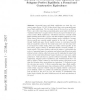904 search results - page 16 / 181 » Game Theory |
FPLAY
2008
14 years 11 months ago
2008
Conflict theory can be used to explain the interactions between societies during times of turmoil and change (i.e. revolutions, strikes or everyday debates). Games have been produ...
SAGT
2010
Springer
14 years 7 months ago
2010
Springer
Abstract. We consider the existence of Partition Equilibrium in Resource Selection Games. Super-strong equilibrium, where no subset of players has an incentive to change their stra...
SAGT
2010
Springer
14 years 7 months ago
2010
Springer
Fictitious play is a simple learning algorithm for strategic games that proceeds in rounds. In each round, the players play a best response to a mixed strategy that is given by the...
CORR
2007
Springer
14 years 9 months ago
2007
Springer
Abstract. Sequential game and Nash equilibrium are basic key concepts in game theory. In 1953, Kuhn showed that every sequential game has a Nash equilibrium. The two main steps of ...
JMLR
2010
14 years 4 months ago
2010
We present a general method for explaining individual predictions of classification models. The method is based on fundamental concepts from coalitional game theory and prediction...



